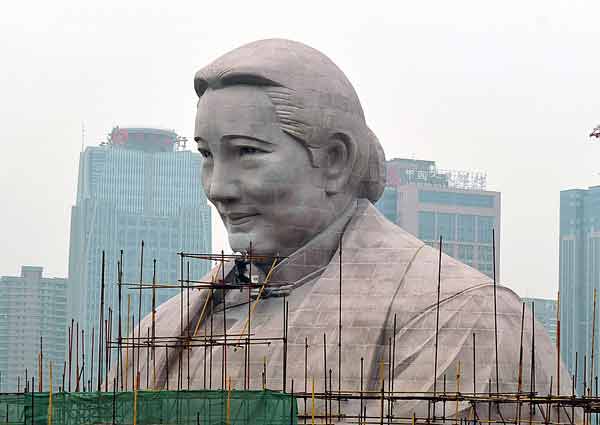Probe into charity's real estate spending
Updated: 2011-11-14 07:00
By Liu Xiangrui and He Dan (China Daily)
|
|||||||||||
 |
|
A 24-meter stone statue of Soong Ching Ling (1893-1981) under construction in Zhengzhou, capital of Central China’s Henan province, on Nov 6. Funded by Henan Soong Ching Ling Foundation, the construction of the statue is reportedly costing 400 million yuan ($63 million). LIU SHUTING / FOR CHINA DAILY
|
The Henan Soong Ching Ling Foundation, a regional public foundation, came under fire after a Chinese media organization revealed that it gave illegal loans and allocated huge amounts of money to invest in real estate and other profitable sectors, while only a small share of its revenue went to charitable causes.
China's regulations require that no less than 70 percent of a public foundation's annual revenue should be used for philanthropic purposes.
Yet figures on the China Foundation Center website show that the foundation ranked first among more than 2,000 Chinese charity foundations in 2010, with total assets of nearly 3 billion yuan ($476 million), spent only 140 million yuan on charity projects that year.
A report by Xinhua News Agency revealed the foundation raised a great deal of money selling health insurance in the vast rural areas of Central China's Henan province, some of which was then lent to property developer.
An anonymous insurance agent in Luohe city, one of the 17 branches for the subordinate body in charge of the insurance - the Development and Management Center for Henan's Charitable Health Insurance - was quoted by Xinhua as saying that he collected about 1.8 million yuan in premiums every year.
The agent, who has run the business since 2007, added that the project named "charitable health insurance" was run in such a way that it would appeal to villagers. He explained that most farmers chose to buy the insurance as they were promised they would receive an annual 400 yuan in interest once they paid 10,000 yuan in premiums.
Earlier last week, the foundation also failed to explain the source of funding for a giant statue of Soong Ching Ling, wife of the 20th-century revolutionary Sun Yat-sen, and an adjacent complex.
The 24-meter-high statue is part of an 800-square-meter complex under construction in Zhengzhou, the capital of Central China's Henan province, which includes a large meeting hall and four six-story buildings that house cinemas, studios and meeting halls.
The project will soon be completed, according to workers on the site who are now burnishing and waterproofing the statue.
The foundation insisted that the money needed for the project, which reportedly cost 400 million yuan, was "self-collected" and refused to give more details.
But media organizations and Web users have questioned this, as it is rare for a regional charity organization to raise so much money for such a project.
The provincial government has formed a panel to investigate the allegations.
Employees from the foundation told China Daily on Wednesday that the officers authorized to answer media inquiries were out of office and could not be reached for comment. China Daily's later calls to the foundation went unanswered.
Xu Yongguang, secretary-general of the Narada Foundation, a private charity focusing on public welfare projects, argued that charity foundations should not be criticized for investment activities that maintain and enhance their asset value.
Given China's high inflation rate and low reserve interest rate, the value of donations shrinks if it is simply saved in banks, Xu said.
Deng Guosheng, director of the non-governmental organization research center at Tsinghua University, said that it is "vital" that Chinese charities make their work more transparent.
Liu Peifeng, an associate professor from the law school of Beijing Normal University, said that China should speed up legislation to regulate the commercial behavior of charity organizations.
Cang Wei contributed to this story.
Hot Topics
HIV/AIDS, Egypt protest, Thanksgiving, climate change, global economic recovery, home prices, high-speed railways, school bus safety, Libya situation, Weekly photos
Editor's Picks

|

|

|

|

|

|







